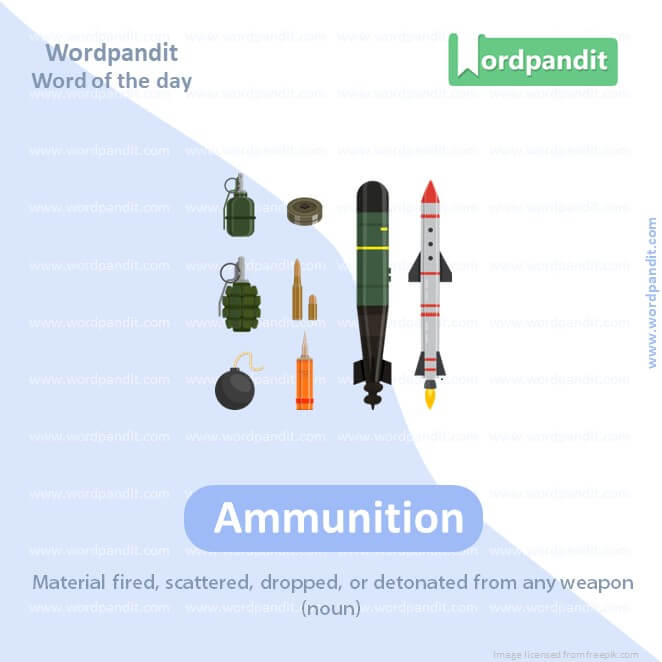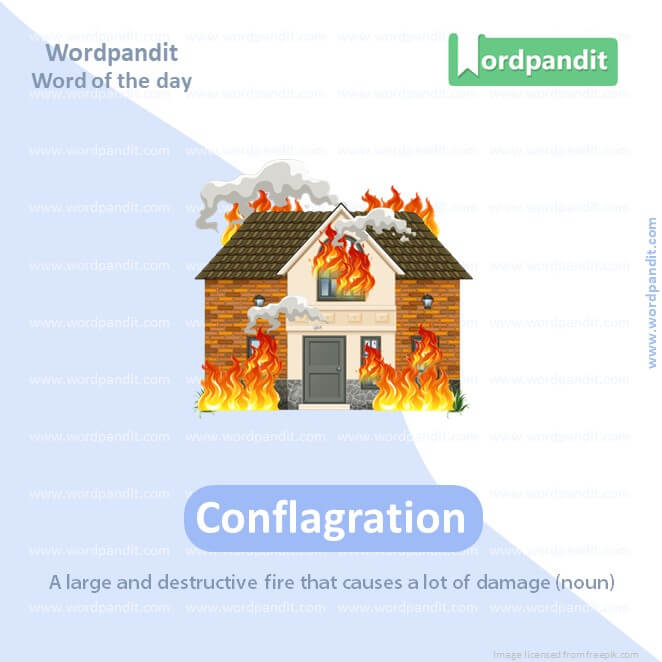Daily Vocabulary Words: List of Daily Used Words in Leading Indian Newspapers
Hi there. Welcome to this special section @ Wordpandit. Our endeavour here is straightforward: highlighting daily vocabulary words that you would come across in leading newspapers in the country. We have included the following newspapers in our selection:
• The Times of India
• The Economic Times
• Hindustan Times
• Mint
• Indian Express
We are putting in extensive work to develop your vocabulary. All you have to do is be regular with this section and check out this post daily. This is your repository of commonly used words; essentially, we are posting a list of daily used words. Hence, this has significant practical application as it teaches you words that are commonly used in leading publications mentioned above.
Visit the website daily to learn words from leading Indian newspapers.

WORD-1: Ammunition
CONTEXT: North Korea has produced and transferred more artillery ammunition to Russia than the West has been able to supply to Ukraine.
SOURCE: Hindustan times
EXPLANATORY PARAGRAPH: Imagine you have a toy gun that shoots soft balls. The soft balls are like the food for the gun to make it work. Ammunition is just like those soft balls but for real guns. It’s what soldiers use to make their guns work so they can protect us.
MEANING: Material fired, scattered. dropped, or detonated from any weapon (noun).
PRONUNCIATION: am-yoo-NISH-uhn
SYNONYMS: Bullets, Shells, Rounds, Projectiles, Cartridges, Missiles, Munitions
USAGE EXAMPLES:
1. The soldiers checked their ammunition before heading into battle.
2. They ran out of ammunition during the training exercise.
3. The warehouse stores ammunition for emergency use.
4. She loaded the ammunition into the rifle carefully.

WORD-2: Equivalent
CONTEXT: the number of Javelin missiles fired was equivalent to what the American industrial base would take seven years to produce.
SOURCE: Hindustan times
EXPLANATORY PARAGRAPH: Imagine you have two toy boxes. One has 5 red balls and the other has 5 blue balls. Even though the balls are different colors, the number of balls is the same. So, we can say the two toy boxes are equivalent because they have the same amount of things inside.
MEANING: Equal in value, amount, function, or meaning (Adjective).
PRONUNCIATION: ih-KWIV-uh-lent
SYNONYMS: Equal, Identical, Comparable, Similar, Alike, Match, Parallel
USAGE EXAMPLES:
1. One kilometer is equivalent to approximately 0.62 miles.
2. The two equations are equivalent in value.
3. He found an equivalent part for the broken machine.
4. Her job in the new company is equivalent to her old one.

WORD-3: Conflagration
CONTEXT: the arc of conflict to the Indo-Pacific, and the significant prospect of a Sino-Indian conflagration.
SOURCE: Hindustan times
EXPLANATORY PARAGRAPH: Imagine a very big fire, much larger than a campfire, that spreads quickly and is very hard to put out. This kind of huge fire, which can happen in forests or big buildings, is called a conflagration. It’s important for firefighters to work hard to stop it.
MEANING: A large and destructive fire that causes a lot of damage (noun).
PRONUNCIATION: kon-fluh-GRAY-shun
SYNONYMS: Fire, Blaze, Inferno, Holocaust, Wildfire, Bonfire, Flames
USAGE EXAMPLES:
1. The conflagration consumed the entire forest in days.
2. Firefighters battled the conflagration for hours.
3. A spark can lead to a conflagration in dry conditions.
4. The historic building was lost to a conflagration.

WORD-4: Deterrence
CONTEXT: We must remember that while deterrence may be costly, wars are costlier.
SOURCE: Hindustan times
EXPLANATORY PARAGRAPH: Imagine if you had a big, scary robot that stopped people from taking your cookies by just standing there looking intimidating. The robot doesn’t have to do anything; its presence alone makes people think twice. Deterrence is like that robot; it’s a way to stop someone from doing something just by making them worried about what could happen if they do.
MEANING: The act of discouraging or preventing a certain action by instilling fear or doubt (noun).
PRONUNCIATION: deh-TUR-uhns
SYNONYMS: Prevention, Discouragement, Intimidation, Inhibition, Restraint, Dissuasion, Disincentive
USAGE EXAMPLES:
1. The country’s strong military serves as a deterrence against attacks.
2. Security cameras are a deterrence to shoplifting.
3. The threat of punishment is a form of deterrence.
4. They discussed the role of deterrence in criminal justice.

WORD-5: Prerequisite
CONTEXT: a vibrant, technologically enabled, innovation-driven industrial base is a prerequisite to winning wars.
SOURCE: Hindustan times
EXPLANATORY PARAGRAPH: Imagine you want to build a tower with blocks. Before you can put the top block on, you need to have the bottom blocks in place. A prerequisite is like the bottom blocks; it’s something you must have or do first before you can do the next thing.
MEANING: Required as a condition for something else to happen; a thing that is required as a prior condition (noun).
PRONUNCIATION: pree-REK-wuh-zit
SYNONYMS: Requirement, Precondition, Necessity, Essential, Must, Foundation, Precursor
USAGE EXAMPLES:
1. Passing basic math is a prerequisite for the advanced class.
2. A driver’s license is a prerequisite for the job.
3. She completed all prerequisites for her degree program.
4. The course has several prerequisites.
WORD-6: Contingencies
CONTEXT: While our MIC may be currently adequate to meet contingencies arising in the RSOW (Responses Short of War) domain, it would need significant resources to meet the challenges of high-intensity combat.
SOURCE: Hindustan times
EXPLANATORY PARAGRAPH: Imagine you’re planning to have a picnic outside, but it might rain. You decide if it rains, you’ll have the picnic inside. That “just in case” plan for the rain is called a contingency. It’s a special plan you make for something that could happen, but you’re not sure if it will.
MEANING: Possible future events or conditions that must be prepared for or against (noun, plural).
PRONUNCIATION: kuhn-TIN-juhn-sees
SYNONYMS: Possibilities, Emergencies, Eventualities, Uncertainties, Scenarios, Plans, Safeguards
USAGE EXAMPLES:
1. The company has contingencies for handling power outages.
2. They set aside funds for unforeseen contingencies.
3. Planning for contingencies is part of good management.
4. The contract includes clauses for various contingencies.
WORD-7: Doubling
CONTEXT: The increase for Jewish Israelis was milder — slightly more than doubling to just over 8.6 percent.
SOURCE: Hindustan times
EXPLANATORY PARAGRAPH: Imagine you have a single apple seed, and you plant it in the ground. After a while, it grows into a tree and produces not just one, but two apples. Now, you have double the amount you started with. This is what “doubling” means. It’s when something increases by two times its original size, amount, or value, like your single seed turning into two apples.
MEANING: Increasing or becoming twice as much or as many (verb).
PRONUNCIATION: duhb-ling
SYNONYMS: multiplying by two, increasing twofold, enlarging, expanding
USAGE EXAMPLE:
1. The company’s profits are doubling every year.
2. By doubling the recipe, we will have enough cake for everyone.
3. He’s doubling his efforts to finish the project on time.
4. The population of the town has been doubling every decade.
WORD-8: Worsened
CONTEXT: The hostile environment has also worsened the relationship between Jewish and Palestinian citizens, raising fears of a return to the violence in mixed Arab-Jewish cities in Israel of nearly three years ago.
SOURCE: Hindustan times
EXPLANATORY PARAGRAPH: Imagine you have a small scratch on your arm that doesn’t seem too bad at first. But then, you don’t take care of it properly, and it starts to get red, swell up, and hurt more than before. The condition of your scratch has gotten worse instead of better. This is what “worsened” means. It’s when a situation or condition becomes more severe, serious, or unpleasant than it was before.
MEANING: Became worse or more severe (verb).
PRONUNCIATION: wur-suhnd
SYNONYMS: deteriorated, declined, degenerated, exacerbated, aggravated, intensified
USAGE EXAMPLE:
1. The weather worsened overnight, turning the rain into a snowstorm.
2. His health worsened after ignoring the doctor’s advice.
3. Relations between the two countries worsened after the incident.
4. The traffic worsened during the holiday season, causing delays
WORD-9: Scrupulously
CONTEXT: the Supreme Court (SC) pressed all high courts to scrupulously follow its guidelines for giving bail and disposing applications swiftly, within two weeks if possible.
SOURCE: Hindustan times
EXPLANATORY PARAGRAPH: Imagine you are coloring a picture and you’re being very careful not to go outside the lines. You’re taking your time to make everything perfect. When you do something scrupulously, it means you’re doing it very carefully and paying a lot of attention to every little detail.
MEANING: In a very careful and thorough way (adverb).
PRONUNCIATION: SKROO-pyuh-lus-lee
SYNONYMS: Carefully, Meticulously, Thoroughly, Diligently, Precisely, Conscientiously, Fastidiously
USAGE EXAMPLES:
1. She scrupulously checked each document for errors.
2. The team worked scrupulously to ensure quality.
3. He scrupulously avoids any appearance of conflict of interest.
4. The research was conducted scrupulously.
WORD-10: Exhortations
CONTEXT: These exhortations are useful reminders of what “should be” and what really “is” the ground reality.
SOURCE: Hindustan times
EXPLANATORY PARAGRAPH: Imagine someone cheering you on, telling you “You can do it!” when you’re trying to finish a race or a tough puzzle. They’re giving you encouragement and trying to motivate you to not give up. Exhortations are those kinds of talks or cheers that help push you to keep going and do your best.
MEANING: Urgent advices or encouragements to do something (noun, plural).
PRONUNCIATION: eg-zor-TAY-shuhns
SYNONYMS: Encouragements, Urgings, Promptings, Persuasions, Appeals, Pleas, Motivations
USAGE EXAMPLES:
1. The coach’s exhortations motivated the team to play harder.
2. His speech included exhortations to strive for excellence.
3. She listened to her mentor’s exhortations carefully.
4. The leader’s exhortations inspired action among the community members.
Vocabulary 100 Words
Diving into the exciting waters of language learning, encountering a list of ‘vocabulary 100 words’ is a common step. These lists, often tailored to specific proficiency levels or topics, present microcosms of the language, cradling essential words that broaden our linguistic comprehension. However, to effectively grasp ‘vocabulary 100 words’, a well-crafted strategy is imperative.
The cornerstone of learning any ‘vocabulary 100 words’ lies in understanding each word with depth. This involves more than just registering the meaning. It extends to understanding its use in different contexts, its nuances, and its connotations.
When navigating ‘vocabulary 100 words’, pacing is extremely important. Rather than trying to absorb all the words at once, a steady approach of learning a few words every day promotes better retention. This assures your brain is not overwhelmed with information, resulting in more effective learning.
Interactivity adds a significant boost while engaging with ‘vocabulary 100 words’. Employ tools like flashcards or digital language-learning apps to make your learning experience more engaging. Regular tests or quizzes provided by these platforms can be beneficial in gauging your progress and identifying areas that need additional work.
Real-world usage significantly enriches understanding of ‘vocabulary 100 words’. Incorporate the words into your daily conversations, writing, or social media interactions. This practice element not only empowers retention but also bolsters your confidence in using these words correctly.
In conclusion, mastering ‘vocabulary 100 words’ is an enriching journey that calls for systematic learning, paced approach, engaging tools, and practical application. As you venture down this path, you’ll find the ‘vocabulary 100 words’ transforming from daunting lists into friendly allies, accompanying you on your thrilling linguistic exploration.













